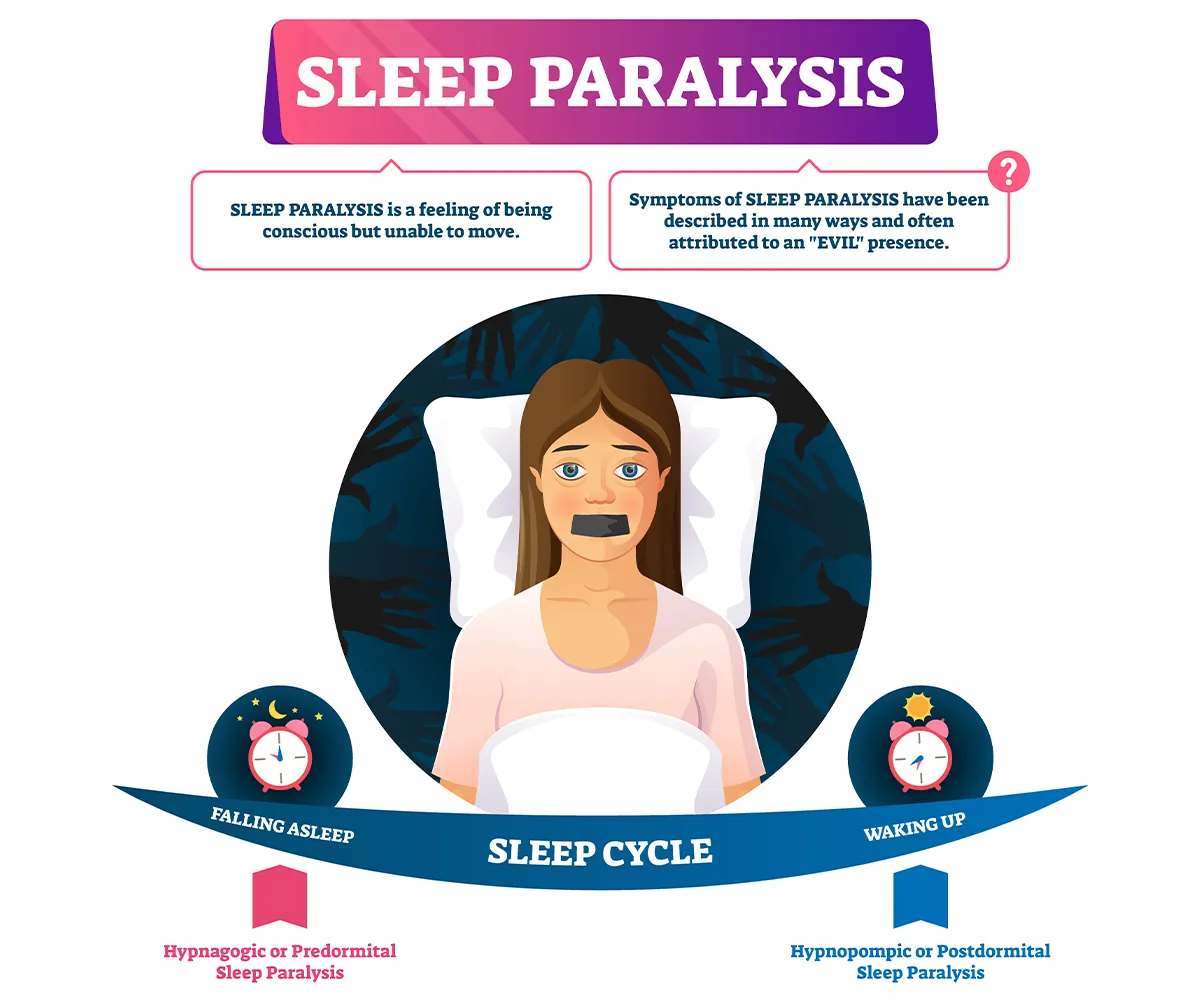Sleep paralysis
Find a doctorImagine waking up, fully aware of your surroundings, but completely unable to move or speak. This temporary condition, known as sleep paralysis, occurs during the transitions between waking up and REM sleep. Although it can be terrifying, sleep paralysis is generally harmless and brief.
Aurora Sleep Medicine Centers can help you understand the underlying mechanisms, causes and strategies for managing sleep paralysis. If a sleep disorder is found, our team of sleep medicine experts can provide you with ways you can prevent sleep paralysis by improving your sleep patterns.
Request a consultation with a sleep specialist near you
What is sleep paralysis?

Sleep paralysis is a phenomenon where you are temporarily unable to move or speak while falling asleep or waking up. It’s a type of sleep disorder that occurs during transitions between stages of the sleep cycle.
Sleep paralysis can be categorized into two main types based on when they occur during the sleep cycle:
- Hypnagogic (predormital) sleep paralysis: Hypnagogic sleep paralysis occurs as you are falling asleep. During this phase, your body begins to relax and enter the early stages of sleep. Typically, you would lose awareness of your surroundings as you transition into sleep. However, if you remain aware while your body enters REM sleep, you may experience hypnagogic sleep paralysis.
- Hypnopompic (postdormital) sleep paralysis: Hypnopompic sleep paralysis occurs as you are waking up. During REM sleep, your brain is highly active, and your body is in a state of temporary paralysis to prevent you from moving during your dreams. If you regain consciousness before a REM cycle is complete, you may experience hypnopompic sleep paralysis, waking up but being unable to move or speak.
Both types of sleep paralysis can be accompanied by vivid hallucinations and a feeling of pressure on the chest, often leading to intense fear and anxiety during the episode.
This condition can be frightening, but there’s no reason for concern. Episodes usually last for only a few seconds to a couple of minutes.
Why does sleep paralysis happen?
Sleep paralysis happens when the brain and body are not in sync during the sleep cycle. During REM sleep, your brain is active, and you may experience vivid dreams.
To prevent you from acting out these dreams, your brain sends signals to inhibit muscle activity, causing temporary paralysis. If you wake up before the REM cycle is complete, you may become conscious while still unable to move or speak, leading to a sleep paralysis episode.
Causes of sleep paralysis
The exact causes of sleep paralysis are not fully known, but several factors may contribute to episodes, including:
- Sleep deprivation: Lack of sleep or an irregular sleep schedule can increase the likelihood of experiencing sleep paralysis.
- Stress and anxiety: High levels of stress and anxiety can disrupt your sleep patterns and contribute to sleep paralysis.
- Sleep disorders: Conditions like narcolepsy and insomnia can increase the risk of sleep paralysis.
- Sleep position: Sleeping on your back is often associated with a higher incidence of sleep paralysis episodes.
- Substance use: The use of alcohol or certain medications can affect your sleep cycle and potentially trigger sleep paralysis.
Symptoms of sleep paralysis
The most noticeable symptom of sleep paralysis is the inability to move or speak when awake. Other sleep paralysis symptoms include:
- Hallucinations: Many people report experiencing hallucinations during sleep paralysis which can be visual, auditory or tactile.
- Feeling of pressure: A sensation of pressure on the chest or a feeling of being choked is common during an episode.
- Intense fear: The inability to move combined with hallucinations often leads to intense feelings of fear and panic.
How to get out of sleep paralysis
While sleep paralysis episodes can be alarming, there are ways to help yourself get out of an episode. Best practices include:
- Stay calm: Remaining calm can help reduce the duration and intensity of the episode. Focus on breathing slowly and deeply.
- Move small muscles: Concentrate on moving a specific small part of your body, such as your fingers, toes, tongue or an eyebrow, to break the paralysis.
- Seek help from a partner: If you share a bed with someone, let them know about your condition. They can help wake you if they notice you are experiencing sleep paralysis.
Sleep paralysis diagnosis
If you frequently experience sleep paralysis, it may be helpful to see your doctor to rule out any underlying neurological conditions. A sleep specialist can rule out any sleep disorders or other issues impacting your sleep.
Undergoing a sleep study can help identify any underlying sleep disorders contributing to sleep paralysis. Your sleep specialist may also recommend keeping a sleep diary, which can provide insights into your sleep patterns and help you and your doctor identify potential triggers.
Treatment for sleep paralysis
Treating sleep paralysis often involves addressing the underlying causes and improving your overall sleep health.
Using best practices to improve sleep can also help with sleep paralysis. Some practices include:
- Establish a regular sleep schedule: Aim for a consistent sleep schedule with sufficient rest each night.
- Reduce stress: Practice stress-reducing techniques such as meditation, yoga or deep breathing exercises. Staying active is good for your sleep health and your overall well-being.
- Create a bedtime routine: Create a relaxing bedtime routine, avoid caffeine for several hours before bedtime and turn off electronics before going to bed.
- Medication: In some cases, medications may be prescribed to manage underlying conditions such as narcolepsy or anxiety.
While sleep paralysis can be a distressing experience, understanding its causes and symptoms can help you manage and prevent future episodes. If you continue to have concerns, schedule an appointment with a sleep specialist for further evaluation and treatment options.
Get Care
We help you live well. And we’re here for you in person and online.